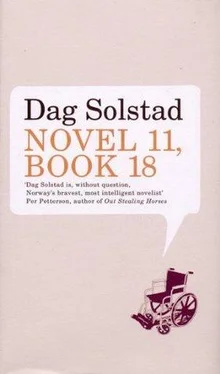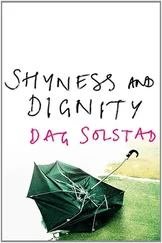The only thing he regretted about this break was that he had not told his wife exactly how things were. Otherwise he accepted that everything had turned out as it did. He still recognised, eighteen years afterwards, that he had done the right thing in abandoning an unsuspecting wife and his small child sleeping in an adjacent room. In order to look for the woman who represented adventure to him, even though he knew that the adventure was now over by the very fact that he was cutting loose from his marriage to follow Turid Lammers. He had no hopes of recovering what had been, but he wanted to preserve the memory of it, of her, that is, to breathe in the same room as her. He could not let her down. He had discovered in this deliberate infidelity an intensity and a suspense that he could usually only observe with fascination, but without fully understanding, in art and literature.
So he had left. After telling Tina Korpi that he was a prisoner of love and had to follow its commands. Tina Korpi seemed to be in a state of shock. Stunned, so to speak, she sat on a chair just staring at him as she repeated, time and again, ‘So that was why, I should’ve known.’ He had feared that there would be harrowing scenes, and especially that, while it was taking place, they would scream loudly at one another and wake up their son, who was lying in the adjacent room, so that they would have to go in and soothe him and that he, perhaps, would have to pick him up. But that did not happen. Bjørn Hansen packed a few personal belongings, which he took to the car, walking back and forth several times, while she, stunned, was still sitting on her chair every time he came back, repeating, like a wail, ‘So that was why.’ Ready at last, he had gone.
He drove to Drammen, under the amber light from the street lamps suspended over the E18, through the town along the eastern bank of the Drammen River, and then up towards Hokksund, still driving along the eastern bank of the Drammen River. At Hokksund there was a fork in the road, with one road leading across the river towards Kongsberg, Notodden, Numedal and Upper Telemark — the one he would take. But before doing so he stopped outside Eikerstua, a roadside pub just before the fork, and went in. Though it was late in the evening, there were still plenty of customers, eating open meat patty sandwiches and drinking coffee, car owners like himself or lorry drivers, their heavy, massive vehicles parked in front of the pub. Bjørn Hansen went straight over to the telephone booth and called Turid Lammers. He felt very nervous as he pushed coins into the slot and dialled the number, for he had not told her in advance that he was on his way. (‘I do not want to be the lover of a married man,’ Turid Lammers had said when she moved to Kongsberg, in a perfectly sober tone which had given him no reason whatsoever to think that she wished he would contribute his share to her not having to.) He heard her voice, while at the same time hearing the krone pieces rattle into the box, so that he could talk and know that she heard him. He told her what had happened and that he was in a roadside pub some twelve miles north of Drammen, near the exit to Kongsberg. He asked if he could come and she said yes.
He took his seat in the car again and drove towards Kongsberg. All at once he was in the middle of Norway, the inhospitable, wooded, remote and (except for those who live there) out-of-the-way Norway, even though he was only forty-five miles from the nation’s capital. It was in the middle of winter, with a heavy snowfall. The road was narrow, though it was a state highway, slippery and winding. High snowbanks left by the plough; cold, compact snow. Flat fields buried in white darkness, gorges and hollows. Scattered farms. Spruce forests. A lone lamp in the night, fixed on the wall of a haphazardly placed modern one-storey building, swept by white whirling snow. Frozen lakes. Icebound rivers. Bedraggled spruces. Icicles hanging from crags that dropped steeply over the roadway and were illuminated by the headlights of Bjørn Hansen’s car. The trip required far more time than he had calculated, because he had to maintain a low speed in this wintry landscape, which he bored into deeper and deeper along the narrow, winding and slippery road, until suddenly, on a steep downhill slope, he found himself on the outskirts of a town. Soon thereafter he turned off the main road and drove into the illuminated streets of Kongsberg.
It was late in the evening, but there was a surprising number of people to be seen, due to the fact that the last movie screening had just ended; it was ten past eleven. He drove around rather randomly in search of a taxi rank. He found one near the railway station and parked there. He walked over to a taxi-driver who sat in his cab waiting his turn. He read out Turid Lammers’s address from a slip of paper and the cabby gave him a meticulous explanation as to how to get there. Five minutes later Bjørn Hansen had parked in front of a large but rather run-down villa which, judging by the address, was where Turid Lammers lived.
She did not stand in the doorway waiting for him. He rang the bell, and some time passed, he thought, before she answered. But when she did, she seemed glad to see him. She had made a fire on the hearth. She was waiting for him with food and drink. She seemed calm and relaxed, far more relaxed than he had expected to find her in the vast draughty villa she had inherited.
As it happened, he would live in this old villa for fourteen years. As Turid Lammers’s partner. And he still lived in Kongsberg. Early on he commuted to Oslo, to his job at the ministry. Who was Turid Lammers? In Oslo she had been an attractive woman in the whirl of the big city whom he had met by chance and who fascinated him. Now she had gone back to her roots, had even moved into her childhood home, and lived in surroundings that had only been occasional (and very charming) attributes of her personality earlier on. As her lover in Oslo, he had mostly been interested in the French element of her past, those seven years in France that had made her wiser (he assumed) and simultaneously conferred upon her movements that acquired grace, which he (on account of the adventure that lent them glamour) could not live without. Especially her gestures. That Mediterranean way of using the hands as an aesthetic adjunct to the voice had fascinated him, in an all but childish way, so much so that he had barely listened to what she said, so preoccupied was he by the way she said it. And so he had only en passant got to know the small-town side of her, which then emerged only within the context of her exotic southern manner. A Frenchwoman who talked about her impossible sister at Kongsberg. But now all this became a daily reality for Turid Lammers, and thereby also for Bjørn Hansen. The Lammers family had in its time owned half of Kongsberg and its environs. Forests, farmland, stores, building lots, woodworking factories, etc. But when her father died only a florist’s and a service station were left, in addition to the old Lammers villa. The sister got the lucrative service station, managed by her husband, and Turid got, after many ifs and buts, the villa, while the florist’s was jointly owned by both sisters. All this led to a wrangling that was not yet over when Bjørn Hansen, after fourteen years, finally moved out of the Lammers villa and acquired his own place. It was basically a question of which sister best represented their legacy, the Lammers name.
On the face of it Turid Lammers was above such matters, and her partner, Bjørn Hansen, thought so too for a long time. She was anti-bourgeois in her very being. She despised fussing over money and her sister’s way of raking it in, as she put it, meaning it quite sincerely, and when a two-hundred-year-old sauceboat slipped from her hands and broke on the floor at one of the parties they gave in the Lammers villa, causing the sauce to ooze out among the broken porcelain fragments, she laughed, and her eyes sparkled as she exclaimed, ‘This is a historic moment! Two hundred years fell out of my hands and was reduced to nothing!’ To a standing ovation from the guests. But Bjørn Hansen knew that the sight of the broken sauceboat affected her painfully. For when this happened he had lived with her, as her husband, for two years.
Читать дальше












